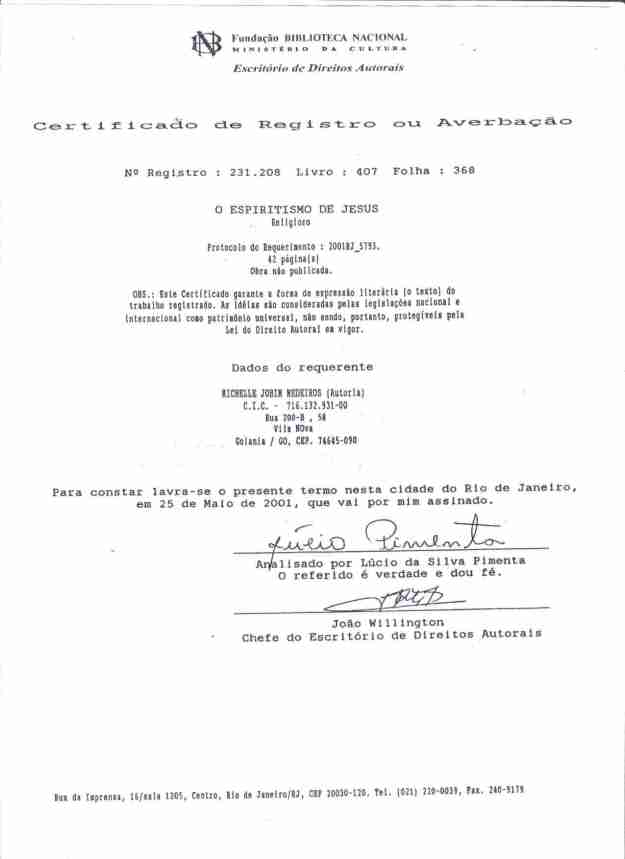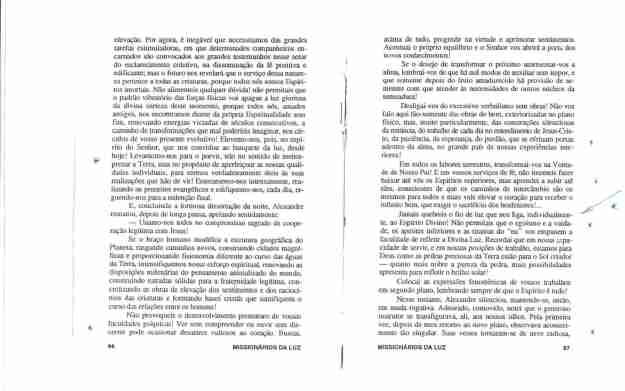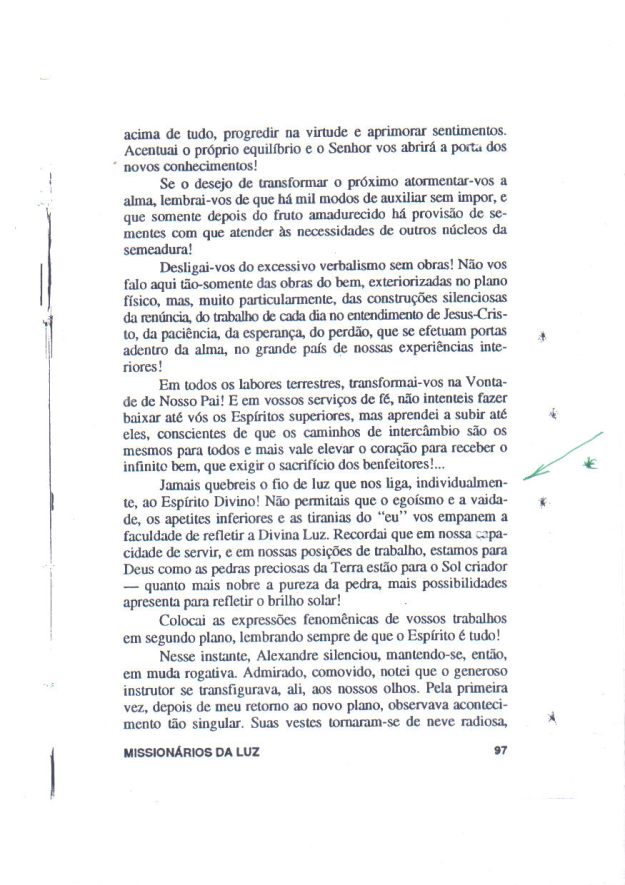
SPIRITISM IS OUR LORD JESUS CHRIST HOLY SPIRIT REVELATION
CORRECT GODS KNOWLEDGE AND CORRECT GODS FRATERNITY ACTIONS
see first page of: http://www.gsgospel2.wordpress.com
Spiritism
SPIRITISM IS OUR LORD JESUS CHRIST HOLY SPIRIT REVELATION
INTRODUCTION
Even amongst those who call themselves SPIRITISTS, only a few really know Spiritism. The majority prefers to hear about it from others rather than study it for themselves. When referring to the SPIRITIST DOCTRINE, the only recognised and reliable sources of information are the works by Allan Kardec, who acted as codifier – a list of which is to be found at the end of the last page.
This page has been prepared because perhaps initially the reading of all of Kardec’s books might offer a daunting prospect for many who wish to know more about this philosophy. However, this in no way reduces the necessity of reading and studying all of these books, which together form the BASIC KNOWLEDGE OF SPIRITISM, if one really wishes to know the doctrine.
WHY SHOULD WE STUDY SPIRITISM ?
Many people today live stressful lives and are not interested in the fundamentals of existence. They prefer to worry about their businesses, their pleasures and their personal problems. They think that matters like “the existence of Our Lord God” and “the immortality of the soul” belong only to priests, church ministers, philosophers and theologians. When everything in their lives is going well they seldom remember Our Lord God. When they do it is only to offer a brief prayer or go to church on Sunday, as if these attitudes were merely obligations which everyone must fulfil in one way or another. For these people, religion is a mere social formality, something that everyone should do, nothing more. Mostly it is a matter of satisfying their conscience, in the hope of being in God’s good books. So much so, that many do not even hold a firm conviction of what they profess, having serious doubts as to the existence of Our Lord God and the continuity of life after death.
However, when these people are beset by some great problem, perhaps a financial disaster, the loss of a loved one or an incurable disease – all situations which can occur in the lives of everyone – they do not find within themselves the necessary faith or understanding which will enable them to face their problem with courage and acceptance; whereupon they invariably fall into despair.
Knowledge of the Spiritist philosophy opens up a wider and more rational vision of existence, by explaining about life in a logical manner. This allows us to begin a process of inner transformation, which inevitably brings us closer to Our Lord God.
WHAT IS SPIRITISM REALLY ABOUT ?
Spiritism answers many fundamental questions, such as:
- Who am I ?
- What was I before being born ?
- What shall I be after death ?
- Why am I living in this world ?
- Why do some people suffer more than others do ?
- Why are some people born rich and others poor ?
- Why are some blind, crippled, mentally handicapped, etc…, while others are intelligent and healthy ?
- Why does Our Lord God permit such inequality amongst His children ?
- Why is there so much misfortune in the world and why does sadness outweigh happiness ?
- Of three people travelling in the same car, which suffers an accident, one dies, one is seriously injured and the third person suffers nothing ? Where is Our Lord God’s justice in this ?
- Why do some bad people suffer less than others who are good do ?
These are questions we all ask ourselves whenever we see so much inequality or endure so many different experiences during the tribulations of life on this planet.
WHAT IS SPIRITISM ?
Spiritism follows a doctrine, which was revealed by Superior Spirits and received through mediumship. All the information was gathered together and codified by a French educator known as Allan Kardec, and was originally published in France more than one hundred and thirty years ago.
Spiritism is a science because it studies all spiritual phenomena by the light of reason and within scientific criterion. There is nothing of the supernatural within Spiritism. Even the strangest phenomena can be explained scientifically and therefore are in the order of natural occurrences.
Spiritism is a philosophy because it investigates the true nature of life by answering questions such as “where have I come from”, “what am I doing in this world” and “‘where will I go after death” ? Every doctrine that offers an explanation of life is a philosophy.
Spiritism is a religion because it has the moral transformation of mankind as its finality. It advocates a returning to the teachings of Jesus Christ in our daily lives. It shows Christianity in its true expression of love and charity.
What is “Spiritist Religion” ? How does it differ from orthodoxy ?
Spiritism is not an organised religion, with a clerical structure. It is in fact profoundly different from all traditional religions. It does not accept the concept that priests or ministers are necessary mediators between God and Man, or that there is any need for religious offices. It has no sumptuous temples or humble churches. It adopts no kinds of ceremonies such as baptism, confirmation, weddings, etc… Neither does it perform any rituals or use candles, nor does it advocate the use of special clothing such as robes, nor overalls during Healing. It uses no form whatsoever of symbolism, ornamentation for its services, reverent gestures, cabalistic signs, blessings ceremonies, talismans or incense. Neither has it adopted the singing of hymns, or the use of ceremonial church music, ritual dancing, alcohol, offerings, etc…
The Spiritism religion is an act of devotion that is performed within each heart. It is the elevation of ones sentiments, of love for ones fellow beings and of constant work in favour of ones neighbour. Only thought that is well balanced in goodness can link us to God and it is only the practice of good actions that make us truly blessed. Spiritism then, seeks to revive the teachings of Jesus in all their simplicity and sincerity, without luxury or social conventions, without pomp or ceremony. This is because the Teacher from Nazareth only recommended that God should be worshipped “in spirit and truth”.
Spiritism is the Consoler promised by Jesus:
“If you love me, keep my commandments; and I will ask the Father, and He will send you another Comforter, that will remain with you forever; the Spirit of truth; whom the world cannot receive, because it seeth him not, neither knoweth him; but you know him; for he lives with you and shall be in you. But the Comforter, which is the Holy Ghost, whom the Father will send in my name, he shall teach you all things, and bring all things to your remembrance, whatsoever I have said unto you.” (JESUS) – John, 14: 15-17 & 26.
BASIC PRINCIPLES OF SPIRITISM (see 14 principles)
The Existence of Our Lord God
Spiritism accepts the existence of Our Lord God as fact. Our Lord God is the origin and end of everything. God is the Creator and the use of all things. God is Supreme Perfection with all the purest attributes our imagination can conjure up and many more. We are not able to understand the full nature of God because we are very imperfect as yet. How can a limited and imperfect intelligence know and understand all that which is unlimited and infinitely perfect?
The Immortality of the Soul
Even before considering ourselves to be human beings and the offspring of our parents, we are in reality Spirits who are God’s children. Spirit is the intelligent principle of the Universe, created by God simple and ignorant so that it may develop and come to fulfilment through its own efforts.
As Spirits we existed before we were born and will continue to exist after physical death.
When a Spirit is inhabiting a physical body it is called a soul or incarnate Spirit. When the Spirit is born it is said to have reincarnated; when death comes the Spirit is said to have discarnated. The discarnated Spirit then returns to the spiritual world from whence it had come before being born. Therefore, Spirits are merely discarnated people who at the present moment live in the spiritual world, which is our true Homeland.
Reincarnation
The Spirit is created simple and ignorant, but having been given free-will (which is the capacity to choose between good and bad) it makes its own decisions and creates its own destiny. In this manner each Spirit has the possibility of developing, evolving and perfecting itself just like a student in school, who passes from one grade to another by means of taking various courses. Spiritual evolution requires intensive periods of learning, which can only be achieved by means of incarnating in a material world. Each Spirit acquires further knowledge through the multiple experiences offered with each physical life and will continue to reincarnate periodically for as many times as is necessary.
The progress achieved by each Spirit during the many experiences it has passed through in every one of its innumerable physical existences, is not only intellectual but most of all moral. It is exactly this aspect of growth that permits the Spirit to approach ever close to God.
But just as every student must repeat each failed lesson once, twice or more times, so a Spirit who has not made good use of its time on Earth may remain stationary for long periods of time, undergoing more suffering, and consequently delaying its evolution.
It is improbable that we will ever know how many incarnations we have already had, and impossible to know how many more we shall need in the future.
Nevertheless, we do know that as backward Spirits we have many, many incarnations still to come until we reach the necessary moral development required to become pure Spirits.
However, not all of these incarnations will take place on this planet. There exist both inferior and superior worlds to Earth. When we have reached a more advanced state of evolution, it is possible that we may then reincarnate on another planet, of a higher order. The Universe is infinite and as Jesus said: “In the house of my Father there are many Mansions”. The planet Earth is a world of inferior moral status, as can be seen by the lamentable panorama of humanity today.
But planets also progress and so this planet is destined to be transformed into a place of regeneration, just as soon as all humanity decides to practise good, accept the brotherhood of men and work towards fellowship.
Forgetfulness of the Past
We cannot remember our past lives and it is here that we see the wisdom of God. If we were to remember all the evil we had done in the past, the suffering we had caused, the enemies we had made or those who had caused us harm, we would be in no state to live amongst them at this moment. Today it is not infrequent that these enemies from the past have become our children, our brothers or sisters, our parents or husbands, our wives or friends, whom we now meet again in close proximity so that we may find reconciliation. It is for this very purpose that reincarnation exists.
One thing is certain, today we are correcting past mistakes perpetrated against others; suffering the consequences of crimes we have committed; while perhaps on the other hand, we are being helped and upheld by those who, in the past, caused us harm. So we begin to see the importance of the “family” unit, where it is customary to remake links that had been cut off in past existences.
Reincarnation then, is an opportunity to make reparation, just as it is also the opportunity to devote our energies toward the good of others, which speeds up our spiritual evolution. When we reincarnate we bring with us a “life plan”, which comprises of promises assumed before God and ourselves with regard to reparation for the evil we have practised and to do all the good we can. Depending on our spiritual condition, we may or may not be able to choose the trials, sufferings and difficulties to be undergone in order to progress.
In this way, reincarnation is the perfect mechanism of Divine Justice. It also explains why there exists so much inequality in the destinies of our fellow creatures on Earth.
The following are the main purposes of life on Earth:
- To make amends for the evil that we have practised; our errors being paid for by various forms of suffering.
- To be able to prove or measure our degree of evolution when faced with the difficulties of life.
- To help Humanity and exemplify goodness before others.
- To fulfil special missions, which is the case of elevated Spirits who offer great service to humanity.
Through the mechanism of reincarnation we can verify that Our Lord God does not punish. We ourselves are the cause of our suffering, because as yet we have not understood the law of “cause and effect”.
Possibility of Communication with Spirits
All Spirits are human beings who have discarnated. They remain just the same as they were while alive; good or bad, serious or jokesters, energetic or lazy, cultured or mediocre, truthful or liars.
They are to be found everywhere and are by no means inactive; they have their occupations just as we do.
There are no specified locations for Spirits. Generally the least perfect ones are to be found close to us, because they are attached to our own imperfections. We do not see them because they exist in a different dimension from our own, but they can often see us, and sometimes know our thoughts.
Spirits act upon us, but this action is almost always restricted to thought because they cannot manage to act directly upon matter. In order to be able to do that they need people who offer special resources; these people are called mediums.
A discarnated Spirit can communicate through a medium, if it is able to and if this is permitted. The communication will depend on the kind of mediumship or faculties of the medium. This may happen through speech (trance mediumship), through writing (psychography), through sounds (typtology), etc…
However, each communication, no matter of what type, should not be accepted blindly. Rather it is necessary to regard all communications with a certain reserve and examine them with due care, so that we may not become victims of Spirits who wish to mystify or deceive us. The reliability of a communication can best be judged by the conduct and character of the medium. If this person is of integrity and good moral principles, then they are able to offer adequate conditions so that good spirits can approach and communicate. A GOOD MEDIUM must be judged on the basis of their moral quality and never by the quantity of mediumship they exhibit.
The Spiritist Doctrine alerts all naive people to the dangers of untruths within communication and to be aware of false mediums. These may attempt to delude all those who are less informed in these matters, in exchange for material gains. For this reason it is important that BEFORE LISTENING TO ANY COMMUNICATION FROM SPIRIT PEOPLE SHOULD INFORM THEMSELVES ON THE SUBJECT, preferably through a study of the SPIRITIST DOCTRINE.
Rationalised Faith
In order that we may only believe what is true, it is first necessary to understand that which we put our belief in. Faith which is not subject to reason is nothing more than blind belief, some kind of absurdity or even superstition. Before accepting something as truth we should first analyse it thoroughly. The great error of most people is to readily believe everything that is said to them, without first making a careful examination of the facts.
“Unshakeable faith is only that which can meet reason face to face in every human epoch” – Allan Kardec.
The Law of Evolution
Every human being is an incarnate Spirit on its way towards Our Lord God. Life on Earth is always an opportunity to make amends and learn as we travel along the pathway towards goodness. There is free choice in all things and the consequences, either good or bad, are the result of our own decisions. This is the law of action and reaction, of causes and their effects. If we are suffering at this moment it is possible that the cause of this suffering comes from errors in this life or from previous ones. Therefore, if we commit evil, then sooner or later we will undergo the consequences of that act. Jesus said: “Each according to his works”. This explains the reason for so much suffering in the world. This is why one person progresses more quickly than another, just as do different students in the same class. The better the conduct the quicker we are able to liberate ourselves from suffering, thereby shortening our path towards evolution.
There is no heaven or hell as depicted by traditional religions. But there does exist a state of the soul, which can be described as either heavenly or hellish. Neither do angels or devils exist, only superior or inferior Spirits, who also are on their way towards perfection. All the time good Spirits are getting better and bad Spirits are regenerating themselves. Our Lord God wishes none of His children to become lost and the Will of God, the Supreme Will, is Law.
If the destiny of each person were to be irrecoverably sealed after death, then all of us would be lost, seeing that we have so far been more bad than good. Almost no one today deserves to go to that so called “heaven of the blessed”, which is only for those who are completely pure.
However long a life may be it is not sufficient for us to reach enlightenment as to Gods plans. Many people have a struggle just to survive, much less have the opportunity to obtain a good education. Many have never received instruction about goodness others die very early, even before they have been able to find out which path to follow.
In order to see the absurdity of the idea of heaven, hell and eternal punishment, it is sufficient for us to ask the following questions:
- How is it that God, being the Supreme Wisdom, would create a child knowing it could go to hell for all eternity ? What kind of God would this be ? Where is the goodness and mercy ?
- What would it be like for a loving mother in heaven, knowing that much loved son was burning in hell ?
The Moral Law
Assuredly, no one is lost. Everyone has the opportunity they deserve. If a human father, who is imperfect, is not able to eternally condemn a son however evil he may be, then how much less able is God, who is a merciful and perfect Father who makes the rain fall on good and bad alike, and the sun to illuminate the just and unjust without discrimination.
Christ said; “No one may see the Kingdom of Heaven if they are not born again”. This is a reference to the physical birth and moral rebirth of human beings. By this we need to understand that each life is always a new opportunity for reconciliation with the superior ideas of goodness and truth.
The aim of all sincere Christians should be to follow the example lived by Our Lord Jesus.
It is of no use to say that you belong to this or that religion. It is of little use to remain praying all the time. The important thing is to practise what you believe every day of your life because, as James said: “FAITH WITHOUT WORKS IS A DEAD FAITH”.
And speaking of faith, have a look at your own life !
- How do you treat the members of your family, such as your father, your mother, your brothers and sisters, your wife, your husband and your children ?
- How do you treat people you do not know ?
- How do you behave during work, at school, at the office, with your friends or on public roads, as compared to the way you behave towards those with whom you live ?
- How do you react to an offence, an aggression, slander, ingratitude or a deception in your life ?
- How do you react to some family problem, the loss of a loved one or an incurable illness ?
- What have you been doing to help others ?
Our Lord Jesus recommended that we “Love one another as I love you”.
There is no other way to love except by being charitable, which means being benevolent, patient, tolerant and humble, as well as always doing to others what we would wish they do to us. As we would not like them to do evil to us, but rather all possible good, then we should act in like manner toward members of our family, parents, friends, strangers and even enemies.
It is the obligation of every Christian to be a worker for goodness by playing their part, however small, in the struggle for a better world.
We can do all of this by looking after our own attitudes better, by being vigilant about our daily behaviour, by being more attentive and polite, by seeing only the good qualities in others and finally, by being ever more demanding of ourselves.
Helping the poor, going to the aid of those who are desperate, looking after those who are sick, counselling the maladjusted, taking comforting words and hope to the afflicted, disseminating and living the teachings of Jesus are all ways of constructing the base for true love, which Christ taught and exemplified almost two thousand years ago.
Our Lord Jesus manifested to the world the true meaning of living love. In trying to follow His example Allan Kardec was inspired to proclaim:
“WITHOUT CHARITY (FRATERNITY) THERE IS NO SALVATION”.
CONCLUSION
Having arrived at the end of this small booklet we hope it has provoked much thought so that many questions and doubts are now awaiting answers. If this is the case then it is a good sign, because you are evidently seeking explanations for life’s many inequalities, apparent unfairness, miseries and violence, all of which are explained in the basic texts of the SPIRITIST DOCTRINE.
These are the five main books as codified by Allan Kardec:
- The Spirits Book
- The Mediums Book
- The Gospel according to Spiritism
- Heaven & Hell
- Genesis





Principles of Spiritism
https://sites.google.com/site/spiritistgroupofglasgow/principles-spiritism
Lord God, Supreme Lord Creator Of The All Universes … For All Your Eternities, Gives Us All Your Felicities, Gives Us All Your Perfections, Gives Us All Your Shaloms, For All Your Eternities, To All Creatures Of All Universes … Forever …
We Ask You, Infinitilions Of Infinitilions Of Times, In Each Infinitesimum Of Each Second, For All Your Eternities, To All Creatures Of All Universes, Forever …

His Majesty, Our Lord Jesus Christ and a Samaritan Woman
A new command I give you: Love one another. As I have loved you, so you must love one another. (John 13:34)
https://www.whitehouse.gov/21stcenturygov/tools/ethics
Victorian Spiritualism — Proponents and Opponents
Dr Andrzej Diniejko, D. Litt.; Contributing Editor, Poland
![]()
[Victorian Web Home —> Religion —> Authors]

number of eminent Victorians believed in the possibility of communication with the world of spirits. Robert Owen (1771-1858), an industrialist and social reformer, became a devout spiritualist in 1853 after having witnessed a series of séances with the American medium Maria Hayden. In 1871, another medium Emma Hardinge Britten (1823-1899) claimed that she had received The ‘Seven Principles of Spiritualism’ from the departed Robert Owen. They were adopted as guidelines by the British National Association of Spiritualists, established in 1873. Edward Bulwer-Lytton (1803-1873), a prolific writer, had a lifelong interest in the occult and Spiritualism. His novels, Godolphin (1833), Zanoni (1842), The Haunted and the Haunters (1859), A Strange Story (1862), and The Coming Race (1871) contain references to occult and supernatural phenomena.
Some Victorians, like Florence Marryat (1833-1899), the author of There Is No Death (1891), The Clairvoyance of Bessie Williams (1893), and The Spirit World (1894), saw Spiritualism as a religion, whereas others, like Arthur Conan Doyle, considered it a science. As Helen Sword writes, William Makepeace Thackeray, Elizabeth Barrett Browning and Robert Browning, Christina Rossetti, John Ruskin, Lewis Carroll, Laurence Oliphant, Rider Haggard, Rudyard Kipling, Andrew Lang, all participated in spiritualist practices at one time or another (5)
Elizabeth Barrett Browning, who was attracted to Swedenborg‘s idea of the resurrection of the spiritual body, was a keen participant in Spiritualist séances. Sir William Crookes, (1832-1919), one of the most important scientists of the late 19th century, the discoverer of thallium (1861) and the inventor of the radiometer (1875), was convinced about the reality of spiritual phenomena. Likewise, Sir Oliver Lodge (1851-1940), a physicist involved in the development of wireless telegraphy, studied psychical phenomena (telepathy) in the late 1880s, and was a member of the famous Ghost Club. In his most controversial book, Raymond or Life and Death (1916), dedicated to his son, who was killed in World War One, Lodge claimed to have heard from mediums that afterlife is not much different from this life. Another outstanding Victorian intellectual, Alfred Russel Wallace (1823-1913), a co-discoverer of the theory of evolution, described his experiences of the spirit world in his book, Miracles and Modern Spiritualism (1896).
Notable opponents of Spiritualist practices included Charles Dickens, who disdained spirit mediumship, but published many articles on the subject in the Household Words. Robert Browning attended Spiritualist séances with his wife Elizabeth Barrett Browning, but was skeptical about the supernatural phenomena. George Eliot dismissed Spiritualism as “the most painful form of the lowest charlatanerie.” (153) Alfred Tennyson said: “I am convinced that God and the ghosts of men would choose something other than mere table-legs through which to speak to the heart of man.” (Cottom 24) Likewise, Anthony Trollope wrote: “But when tables rap, and boards write, and dead young women come and tickle my knee under a big table, I find the manifestations to be unworthy of the previous grand ceremony of death.” (Cottom 25)
Michael Faraday (1791-1867), a physicist and chemist, who discovered electromagnetic induction, believed that Spiritualism was a hokum. In a letter to the Times in 1853, Faraday argued that table-tilting could be effected rather by involuntary muscle movement rather than unseen spirits. However, as Georgina Byrne observes, “After Faraday had died, his ‘spirit’ returned to a séance to admit that he was wrong in life and that claims of spiritualism were valid.” (37) Thomas Henry Huxley (1825-1895), the famous biologist, wrote: “The only good that I can see in the demonstration of the truth of ‘Spiritualism’ is to furnish an additional argument against suicide. Better to live a crossing-sweeper than to die and be made to talk twaddle by a ‘medium’ hired at a guinea a seance.” (Sword 4)
Ghost-Written Literature
It should be noted that several books were published as automatic transcripts of messages allegedly dictated by the ghosts of deceased authors. After his death Charles Dickens, of all Victorian authors, was the most frequent target of medium communications in séance rooms. As is known, Dickens did not finish his last novel, The Mystery of Edwin Drood. In 1873, Thomas James, an American printer, completed it, claiming that Dickens’s spirit had dictated it to him.
William Thomas Stead (1849-1912), a noted journalist and social reformer, announced that he had received spirit communications from the departed Julia Ames, an American temperance reformer and journalist, which he published in the book After Death or Letters from Julia (1892). In 1926, Mrs. Hester Travers Smith (1868-1949), the daughter of a distinguished Shakespearian scholar, Professor Edward Dowden, and the wife of the prominent Dublin physician, claimed that she had received a message from the spirit of Oscar Wilde and published in the book, Psychic Messages from Oscar Wilde.
Related Material


MISSIONARIOS DA LUZ 2002
MISSIONARIOS DA LUZ 2002
THE LAW OF OUR LORD GOD, ONLY TWO WAYS, OR FRATERNITY OR DEATH
(Death=Very long lifes in Purgatory or Hells)
HOLY BIBLE IS A SPIRITIST BOOK (FULL OF PARANORMAL FACTS)
GOOD SAMARITAN UNIVERSE SHALOM
THE LAW OF GOD
FRATERNITY IS FELICITY TO ALL PEOPLE
OUR LORD JESUS PRACTICES SPIRITISM IN TRANSFIGURATION, LUKE CHAPTER 9
OUR LORD JESUS TEACHES SPIRITISM IN RICH AND LAZARUS PARABLE, LUKE CHAPTER 16
THE MOST IMPORTANT QUESTION OF SPIRITS BOOK OF ALLAN KARDEC
IS QUESTION 121, (121) WHY DO NOT ALL PERSONS PRACTICE ONLY GOOD ACTIONS?
121. How is it that some spirits have followed the road of good, and others the road of evil ? (THE SPIRITS BOOK of Allan Kardec-1857)
“Have they not their free-will? Our Lord God has not created any spirits bad; He has created them simple and ignorant, that is to say, possessing an equal aptitude for good and for evil. Those who become bad become so of their own free-will.”
GOOD SAMARITAN UNIVERSE SHALOM
http://bostonreview.net/world/laura-premack-dead-man-talking-brazil-spiritism
Our email: gsgospel1@hotmail.com
